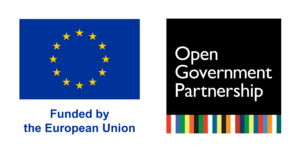Faces of Open Government: Sarah Wesonga
Meet Sarah Wesonga, Program Officer for TransparencyAccording to OGP’s Articles of Governance, transparency occurs when “government-held information (including on activities and decisions) is open, comprehensive, timely, freely available to the pub... More and Access to Information at ARTICLE 19 Eastern Africa.
With a passion for the transformative role of information in modern society, Sarah guides us through her efforts to create an enabling environment for transparency and information rights while exploring methods that can safeguard against discrimination in honor of the 16 Days of Activism against gender-based violenceReforms that combat gender-based violence are essential for fostering an inclusive society and government that respects human rights and promotes gender equality. Technical specifications: Commitments... More.
You have worked with ARTICLE 19 on digital governanceAs evolving technologies present new opportunities for governments and citizens to advance openness and accountability, OGP participating governments are working to create policies that deal with the ... More and ensuring that all people everywhere can freely express themselves and actively engage in public life without fear of discrimination. What inspired you to work on open government issues?
In my role as a human rightsAn essential part of open government includes protecting the sacred freedoms and rights of all citizens, including the most vulnerable groups, and holding those who violate human rights accountable. T... practitioner with a focus on the right to informationThe legal right to request information from the government allows the public to follow government decision-making, participate in ensuring better decisions, and hold the government accountable. Techni..., I had the opportunity to observe the powerful intersection between access to information, citizen empowerment, meaningful participation, and strengthening of oversight and accountability. It became clear to me that when citizens can access public information, it empowers them to demand their rights and hold those in power accountable. This realization sparked my interest in open government issues.
My trajectory underwent a significant shift during my advocacy work for the enactment of a national access to information law in Kenya, a pivotal move mandated by the Constitution. Working on the OGP process with the government, we’ve shed light on the potential of leveraging OGP as a strategic advocacy platform to make the government of Kenya more open, accountable and responsive to its citizens.
As governments continue to see big changes in the digital age, what emerging digital tools are the most innovative to democracy?
Governments across the globe are recognising the transformative potential of emerging technologies as catalysts for progress. Democracies are heavily investing in open dataBy opening up data and making it sharable and reusable, governments can enable informed debate, better decision making, and the development of innovative new services. Technical specifications: Polici... platforms to make government data accessible to the public and empower citizens to analyze information and make informed decisions. Simultaneously, social media platforms like Facebook, X, YouTube, and TikTok, offer spaces for public discourse, political activism, and information dissemination. While social media demands a nuanced approach to address challenges like misinformation, disinformation and algorithmic biases, it remains instrumental in promoting citizen engagement, providing arenas for open dialogue, freedom of expressionJournalists and activists are critical intermediaries connecting public officials with citizens and serving as government watchdogs, and their rights and safety need to be protected. Technical specifi... More, and public feedback.
Additionally, artificial intelligence (AI) plays a pivotal role in data analysis, helping governments make data-driven decisions for effective policy planning and informed decision-making. With applications spanning health, agriculture, climate, energyEnsuring universal access to sustainable, dependable, and affordable energy is critical to every aspect of prosperity. Increasing public oversight and transparency in the energy sector can help to ens... More, and urban development, governments worldwide are integrating AI to address real-life challenges. Blockchain technology is also gaining prominence for ensuring the integrity and security of government transactions, particularly in areas like secure voting systems, transparent record-keeping, and even public procurementTransparency in the procurement process can help combat corruption and waste that plagues a significant portion of public procurement budgets globally. Technical specifications: Commitments that aim t... More.
Open government reformers such as yourself have raised concerns over the unregulated use of artificial intelligence, algorithms, and more. What risks are associated with these digital tools if left unregulated?
A key concern of unregulated digital tools is the potential to perpetuate or even exacerbate biases and discrimination, which may result in discriminatory outcomes like biased decision-making, particularly against marginalized groups, reinforcing social inequalities. The lack of oversight may lead to the proliferation of misinformation and the manipulation of public opinion.
Alongside these concerns is the lack of transparency and accountability in decision-making processes. The opacity resulting from a lack of regulationGovernment reformers are developing regulations that enshrine values of transparency, participation, and accountability in government practices. Technical specifications: Act of creating or reforming ... makes it difficult for citizens to understand how certain conclusions or actions are reached, weakening public trust in government systems and violating citizen’s right to information. Privacy concerns also arise due to the extensive collection and use of personal data in AI systems, potentially compromising individuals’ privacy rights if not adequately protected.
How do these risks affect marginalized communities, particularly women? How can unregulated digital technologies contribute to gender-based violence?
The impact of digital risks on marginalized communities, specifically women, is profound and multifaceted. Unregulated digital platforms can amplify harmful genderOGP participating governments are bringing gender perspectives to popular policy areas, ensuring diversity in participatory processes, and specifically targeting gender gaps in policies to address gov... More stereotypes, reinforcing traditional norms that contribute to gender-based violence. Misuse of algorithms may also perpetuate discriminatory content, further entrenching harmful narratives. The existing structural, economic, and societal gender disparities, including the digital divide, poor digital literacy, and limited cybersecurity awareness, already limit women’s ability to access the benefits of digital governance opportunities and ultimately, cause the exclusion of women in digital governance and economic spaces.
Digital tools, when unregulated, can also be weaponized to stalk, harass, and intimidate women both online and offline. The absence of regulations can facilitate various forms of tech-assisted gender-based violence. Women, especially those working in professions involving a public online presence such as politicians, journalists, and human rights defenders are particularly targeted through online gendered disinformation campaigns, cyberbullying, harassment, hate speech, and threats of violence to them and those close to them. The convergence of racism, religious bigotry, ableism, homophobia, misogyny, and sexism results in heightened exposure and multiple forms of violence concurrently.
A 2021 study by UNESCO on global trends in online violence against women journalists revealed that 73 percent of female respondents experienced online violence, including threats of physical violence, death threats, sexual violence, and offline attacks connected to their online experiences. The lack of clear regulations undermines efforts to establish effective redress mechanisms, perpetuating a cycle of impunity for victims of gender-based violence.
Having worked with OGP for quite some time, in your opinion, how can platforms like the Open Government PartnershipThe Open Government Partnership (OGP) is a multi-stakeholder initiative focused on improving government transparency, ensuring opportunities for citizen participation in public matters, and strengthen... More help advance international norms to regulate these tools?
Evidently, OGP has proven itself as a collaborative space where civil society and governments can effectively work together on meaningful reforms. OGP represents an opportunity for fostering multi-stakeholder dialogue, ensuring a diverse range of perspectives is considered, which is crucial for developing international standards in the regulation of digital tools.
Platforms like OGP can also operate as vital knowledge-sharing platforms where countries can showcase successful initiatives and best practices in regulating digital tools. This could motivate members to experiment with innovative policies and approaches as well as pilot programs and inventive projects, where they can test regulatory frameworks for digital tools.
In the realm of gender equality, platforms like OGP could be instrumental in supporting reformers to develop and implement regulations that specifically consider the impact of digital technologies on women in all their diversity, ensuring that new tech can contribute to an inclusive, safe, and rights-respecting online environment. Achieving this requires the establishment of robust legal frameworks, awareness campaigns, and collaboration with tech companies to encourage responsible innovation that prioritizes gender equality and safeguards the rights of all individuals, irrespective of gender or marginalized status. At the global level, it emphasizes the necessity of regulations or co-regulations that align consistently with international human rights standards.
What is your message to other reformers in government or civil society working on these issues?
Let’s prioritize the protection of human rights in digital governance. Despite significant advancements in the digital age, there is a concerning backdrop of democratic backsliding. The Global Expression Report 2023 by ARTICLE 19 shows that the 21st century has witnessed a disaster for the fundamental rights to speak, know, and participate: only 13 percent of the world’s population, approximately one in every seven people, live in countries where they can freely seek, receive, or share information.
Regressive legislationCreating and passing legislation is one of the most effective ways of ensuring open government reforms have long-lasting effects on government practices. Technical specifications: Act of creating or r... targeting civic activism, peaceful demonstrations, intimidation of journalists, human rights defenders, dissenting political voices, and regulations that hinder internet access and affordability show evidence of a shrinking civic space. This not only stifles citizens’ voices and poses a threat to civil society’s existence but also challenges the collective power of citizens for sustainable development and the ability to determine their own futures.

This edition of Faces of Open Government was supported by the European Union.


Daniel Manyasi Reply
With the Access to Information Act 2016, Kenya has indeed made a step in open governance.
Congratulations Wesonga for commendable advocacy!